Photographs: Anil Dayal/Reuters
The Congress-led United Progressive Alliance is considering the possibility of discussing the Ranganath Mishra Commission's report in Parliament. The commission's report, which was tabled in Parliament last December, recommended 15 per cent quota for the minorities in jobs and educational institutions.
The Bharatiya Janata Party has already warned that it will fight tooth and nail the government's efforts to grant reservation for minorities.
In an interview with Neerja Chowdhury, Union Minister of State for Minority and Corporate Affairs Salman Khurshid explores the arguments for and against such a reservation, and concludes that it is necessary to implement such a step.
At the conference of state minority commissions, Home Minister P Chidambaram said that he favoured reservations as a tool for affirmative action. You were also present at the conference. What is your view on the subject?
When Chidambaram said that, he had given thought to it. It wasn't an off-the-cuff remark. Basically, it endorses the idea of reservation per se. He is not alone in his belief. A large number of people see a method of empowerment in the effort.
The issue that arises out of this is: Reservation for whom? Is each disadvantaged person entitled to reservation or are only some entitled to it?
The bottom line is that those who suffered humiliation in Hindu society are recognised in the Constitution as being entitled to special treatment. Reservation for them was meant to be for a specific period. It has now gone on for several decades. One expects it will continue in that manner in the foreseeable future.
'Backward quota was monopolised by powerful communities'
Image: Muslims attend a rally to demand reservation in jobs and educationPhotographs: Adnan Abidi/Reuters
You are talking of Dalits here, but what about the Other Backward Classes?
The Constitution left another little window open for the 'other than' Dalits, who are socially and educationally backward and have inadequate representation in the government. They could be given reservation. That is how the OBC list for reservation appeared. As a result, lists were drawn up in states on who comprised the OBCs. But a Thakur in Karnataka was found to be backward whereas a Thakur in north India was not.
Again, till such time they have inadequate representation, they can be given reservation -- that is 27 per cent. This reservation was done only for jobs. That was the second thing that happened. The Mandal (Commission) agitation took us forward and then came reservation in education institutions.
Today, it is devolving further and we are looking at the question of reservation for Muslims as a community, and therefore a reservation that is religion-based, which is not allowed in the Constitution.
Now arises the issue, do you stop here or look at others who are similarly backward? There was no distinction between one religion and another (in the OBC lists drawn up). If a Hindu was backward, he was included. If a Muslim was backward, he was included. Then there came a kind of sense that more Hindus from backward classes were included and Muslims from backward classes were less prominent.
Already Muslims from backward classes have reservation within this 27 per cent quota for OBCs and communities like Ansaris and Qureshis etc qualify for it.
But over the years, it was found that the backward quota was monopolised by more powerful communities like the Yadavs, Kurmis and Lodhs. Therefore, pressure grew to divide the backwards further between the backwards and the most backwards and dividing Hindu backwards and minority backwards. And the minority backwards started to say 'give us our share'.
'Reservation for Muslims has been going on for 20 years'
Image: Kashmiri women attend a religious ceremony in SrinagarPhotographs: Fayaz Kabli/Reuters
Over the years, various states have gone in for different models of reservation and Andhra Pradesh is only one of them.
This (reservation for Muslims among OBCs) was done in Tamil Nadu and Kerala, which by the way has 4 per cent reservation for Muslims. It was found that the list of minority backward communities included 95 per cent Muslims. When Karnataka went in for it -- they have 6 per cent reservation for Muslims -- they said all Muslims were backward. So did the Sachar Commission. It was a rough and ready percentage and nobody challenged it.
How long have these southern states had reservation for Muslims?
It has been going on for 20 years in all three states. Nobody challenged it. Andhra Pradesh also had this. The moment you introduce another category of Muslims, there is the chance of somebody saying it is religion-based, for it looks like it is based on religion.
The second thing that happened in Andhra Pradesh was that they did not do an extensive enough survey. The problem till today is: What are the criteria for backwardness? There is no definitive test of backwardness. The Supreme Court has not given it. The courts have not been able to define it. That is a major problem.
What is the difference between the recommendations of the Sachar Commission and those of the Ranganath Commission, as both make a case for reservation for Muslims?
Sachar took the data available and said that the whole community is backward, they are worse off than Dalits. The condition of Dailts has obviously improved; they have had reservations for over 50 years. The Sachar Commission urged the government to do something to address the problem, and suggested pursuing the Kerala and Tamil Nadu models. Karnataka came to the conclusion that all Muslims are backward. This is where we stand.
Are Parsis or Christians backward?
Image: Activists from Bodo tribal community demand reservations in ParliamentPhotographs: Utpal Baruah/Reuters
What about the Ranganath Mishra Commission's recommendations?
The Ranganath Mishra Commission gives another alternative, and says that there should be 15 per cent reservation for minorities, 10 percent for Muslims and five per cent for others.
What is your view on the Ranganath Mishra formula?
The flaw in this argument is: Are they agreeing that Parsis (who are also a minority) are backward? Or that Christians are educationally backward? Or for that matter are Sikhs backward? If not, how can they include them in the 15 per cent? The government has to examine this on merit.
So you are not so keen on Ranganath Mishra Commission's recommendations?
My worry is that it may not stand the scrutiny of law, whereas the Sachar Commission's recommendation has been tested. It has been tested in three states. In Andhra Pradesh, there are some questions about its scientific application. If this is the history of the idea, why should we not implement it? It is less likely to fall in court.
Now let's come to the politics behind it
We (the Congress) stated in our manifesto that we will give reservation to Muslims within the 27 per cent quota. We repeated it before the 2009 Lok Sabha elections, after having debated it. The question is whether what we are saying is justified or not. We think it is justified.
Could it not lead to a Hindu backlash, polarising the situation along Hindu-Muslim lines, to the detriment of the Congress, as has happened in the past after the Mandal Commission's recommendations were implemented in 1990?
People question it on three counts. One, the issue is religion-based. The Constitution does not allow caste-based reservation except to Dalits. But reservation has been given to castes like Yadavs, Lodhs and Kurmis, because they are being given reservation as a class. But you don't want to give Muslims reservations as a class. Instead, religion is brought in.
The second issue raised is that some Muslims are clearly upper class and well educated, like me, so they don't deserve reservation. But in any class, you go out by way of (being) the 'creamy layer'. While defining the class, we are included, while giving benefits, we are excluded because of the 'creamy layer' (argument).
The third argument is that it is divisive. It will be divisive if you were to say that let's give Muslims 15 per cent and take it away from other average non-Muslim communities. But if it is given within 27 per cent, they should have no complaints.
Except, perhaps, the objection may come from say the Yadav community (who have benefited the most from reservations). But then what happens to their 'MY' (Muslim-Yadav) formulation? They cannot say they won't give reservation to Muslims, for whom they have been speaking up.
'Reservations for Muslims won't create a political backlash'
Image: Students take part in a silent march during a protest march against reservationsPhotographs: Parth Sanyal/Reuters
Where do you see the hiccups (in implementing reservations for Muslims)?
We don't know the population of the backward classes in this country. We can only rely on the figures of the 1931 Census. Even this census, which has just started, will not go into it. The OBC leaders say that these classes comprise 54 per cent of the total population, but have only got reservation for half their number -- that is 27 per cent.
If backward Muslims are 8-9 per cent, then by that token they should have 4.2 per cent reservation.
The Sachar Commission said that minorities comprise 8 per cent of the population, therefore 6 per cent should go to Muslims and 2 per cent to the other minorities. Among Muslims, approximately 80 per cent belong to backward classes, and assuming the 6 per cent set by Sachar is correct, then the tested formula already applied in four states is giving four-six per cent reservation to Muslims among backward classes.
If we were to go by the Ranganath Mishra Commission's figures, we will be giving 10 per cent reservation to Muslims and going by an untested formula. Isn't a bird in hand better than two in the bush?
Who has asked for reservation among Muslims? It is people from the backward classes. It is the Pasmanda Samaj that asked for it. Bihar has already done this. They are talking about Mahadalits; the Constitution says a Dalit is a Dalit.
Coming back to my earlier question, don't you think reservation for Muslims will create a political backlash?
I don't think so. The Hindus will have 50 per cent -- that is the non-reserved category. The Dalits will have 22.5 per cent. The backward Muslims will get reservation within the 27 per cent category. Can the other backward communities say 'we will give Muslims only half a per cent, and we will protest if they get it'?
'A Dalit should say I have made it on my own'
Image: Gujjar protestors at a rally to demand Scheduled Tribe statusPhotographs: Adnan Abidi/Reuters
It is said that Muslim backward communities are known by different names and these could have been included for reservations, without making a point of giving it to 'Muslims' as a special group?
Yes, the Muslim naais are called Salmanis for instance and the Hindu naais are called Sain. Similarly the Ansaris are bunkars. If we do not make a point of it, they will say we have not got anything.
We are not doing it only for votes, but because they have a right. But we should get their appreciation and support. Overall, the picture is that unless we help them (backward Muslims), we will hurt the country. Religion cannot be the basis for reservation. At the same time, religion cannot be the basis for denying them reservation.
Janata Dal-United chief Sharad Yadav often says that Yadavs have been ostracised socially because of being Yadavs.
There is no evidence of that. They were not given reservation on the basis of that, but for being socially and educationally backward.
An empowered Yadav or Muslim comes out of the backward class, an empowered Dalit does not come out. That is the argument as it stands today. (Lok Sabha Speaker) Meira Kumar should come out of the backward class, she should do a (United States President Barack) Obama. A Dalit should say I have made it on my own; I don't need your help. But that has not happened so far.
'Muslim leaders also have a responsibility towards the community'
Image: Children read the Koran at a madrasaPhotographs: K K Arora/Reuters
So you plan to go ahead with reservations for Muslims among the backward classes?
Unless there is a major rethink. It is in our manifesto. If Chidambaram, who is a senior Congress leader, cerebral, a legal mind, a member of the core group of the party and of committees like the cabinet committee on political affairs, comes to the conference of state minority commissions and says that reservation is the way to empowerment, I assume he is saying it in the context of backward Muslims.
Why not have reservations using the economic criteria?
The Supreme Court said it did not make sense. Where will you draw the line? If a guy gets a job, he will stop being a backward. Backward is taken as a group or class issue, not as an individual issue. Economic backwardness can be taken into account for giving better opportunities. But economically weak people do not form a group. A Brahmin cannot be a weak group. Some Brahmins can be weak, and their needs can be addressed by giving them scholarships etc.
Of all the state models that have been followed, which do you prefer?
My preference does not matter. The Backward Class Commission will have to decide whether Muslims as a whole are backward or a part of the Muslim community is backward. I must add that at the end of it, the Muslim leaders also have a responsibility towards the community.
What is the timeline you are looking at for implementing reservations for Muslims?
There is no timeline, but expectations are growing and we have to move towards it.

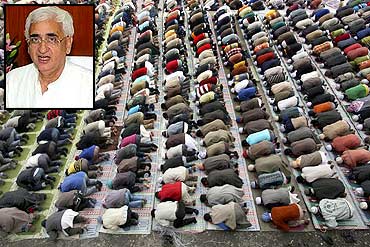
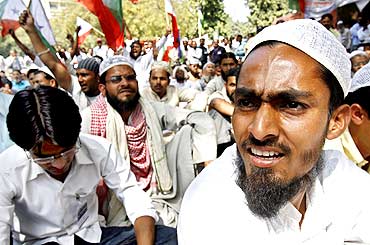
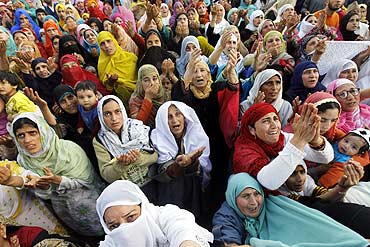
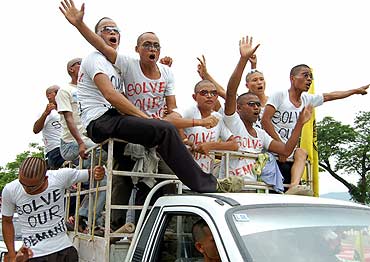
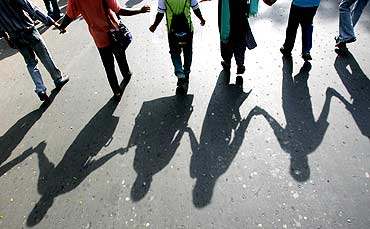
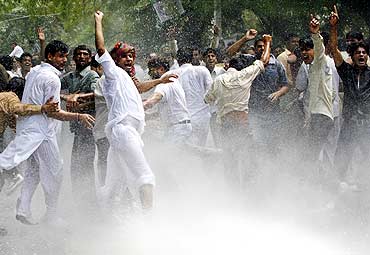
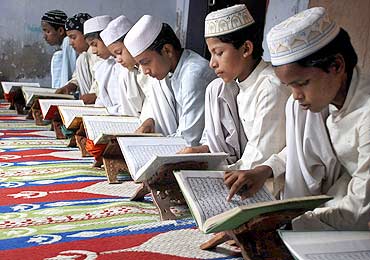
article